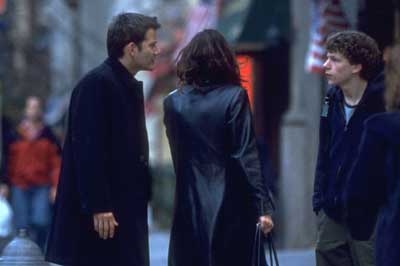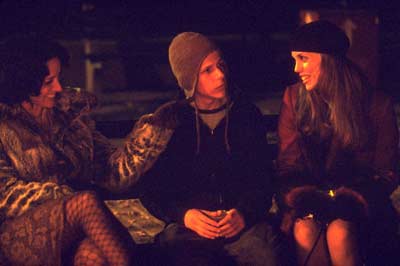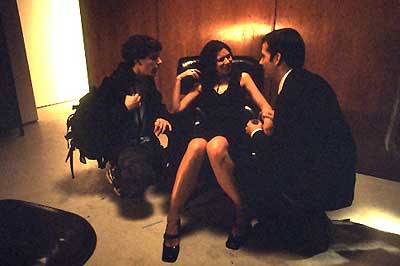Roger Dodger
Great character study, eh readers? (Wink).

I am in my mid twenties, aren't I? Despite finding great comfort in the schlock gorefest of Freddy Vs. Jason, the most rewarding film I saw this weekend was undoubtedly Roger Dodger. Ostensibly a critique of one lonely man's mid-life crisis and the projection of his own insecurities upon his young visiting nephew, it somehow manages to be touching, funny, poignant and engrossing without anything much actually ever happening. It also, unfortunately, has nothing to do with everyone's favourite Beano grifter. Still, can't have it all ways, eh?
Campbell Scott is Roger Swanson, a copy writer for an advertising agency whose affair with his boss Joyce (Isabella Rossellini) has come to a close, sparking a series of encounters between Roger and various anonymous women who soon discover a) his exemplary way with words and b) his uncanny ability to read people's psyche and make them feel utterly worthless about themselves. Seeking validation for his own meaningless existence, Roger is on a self destructive mission to push pretty much everyone away by undermining their own beliefs in themselves, perhaps most notably his long-estranged sister with whom he hasn't had contact in years.
Quite the surprise then that one day upon entering his workplace he should find his young nephew Nick (Jesse Eisenberg) awaiting his arrival. A shaggy, babe-repelling sixteen year old with serious insecurity issues, Nick informs his Uncle he's on vacation in New York and his mother suggested he look Roger up. Initially quite thrown by this unannounced arrival, Roger seizes the opportunity to bestow upon Nick the wisdom of his womanising ways, promising him "sex is everywhere" and launching into an impromptu course on attracting nay snaring the opposite sex.

So begins the lesson. With the single objective of getting Nick laid, Roger takes his young prot?g? out for a night on the NY tiles, asserting that like advertising the key is to convince the ladies they're missing something in their lives, and that something is you. It isn't long before the pair manage to convince two lovely young ladies to their table in a trendy club. After some utterly magnificent banter between Roger and Nick ("This is my nephew. His name is Jesus."), Andrea (Elizabeth Berkley) and Sophie (Jennifer Beals) are allured enough by the conversation to accompany the pair to a park where they share a bottle of wine. Guiding his understudy toward the 'kill', Roger begins to be upstaged by the youngster's natural innocent charm, and his offhand comments soon offend the girls enough for them to beat a hasty exit. Of course, this was all part of Roger's plan coughcough and allows Nick the opportunity to follow the girls on his own. Unable to close the deal, Nick is nonetheless privvy to a cracker of a kiss from Sophie, which is arguably more success than Roger could hope to have achieved.
So the hunt continues throughout various bars and ultimately to Joyce's party, an event to which Roger has not been invited but gatecrashes anyway. It is here with a drunken guest that Nick finally has the opportunity to score, but wisely refrains from taking advantage of a helpless woman. Nigh on incensed by his nephew's failure to achieve freedom from the cherry, Roger finally falls back on his "failsafe"; namely a trip to a brothel. Finally Nick gets as far as popping the old chap out, an act that gives his female companion a chuckle and necessitates a little fellatio to, how can one put it, 'lengthen the proceedings'. Unbelievably, it is at this point that Roger himself has a moment of clarity, the sight of sick old men dragging clearly distressed young girls into booths for sex proving too much and precipitating his forcibly removing Nick from the brothel.
Returning home to find a frantic message from his sister on the answerphone, Roger discovers Nick has in fact run away from home, and suddenly faces the true responsibility of his situation. Packing Nick home in a taxi, Roger quietly returns to his apartment and takes stock of his existence, eventually taking the decision to visit his sister and nephew in their home. Here he finds redemption in his family and apparently (or rather hopefully; we never actually find out) renounces his old way of life, the film refreshingly crediting it's viewers with the necessary intelligence to decide for themselves if Roger is a changed man.

That Roger Dodger succeeds is largely down to it's star. Campbell Scott is absolutely outstanding as the wannabe womaniser of the title, finding an incredible balance between charm, sympathy and the despicable. Aided by a fantastic script by writer/director Dylan Kidd, Scott lures the audience with his observations and linguistic prowess just as he initially seems to impress the ladies before finally emerging as something of a minor monster. The subtlety of his transformation, or rather gradual peeling back of the layers to reveal his true nature is superbly handled, and the sense of his own self-hatred is increasingly palpable without ever having to be signposted by either actor or director. His support from Eisenberg is also worthy of note, the young actor feeding off Scott with skill as Roger projects his own insecurities upon the youngster in whom he eventually sees himself and his flaws reflected. As Nick, Eisenberg walks the line well between idolising naivety and being, as Roger himself so succinctly puts it "just spastic enough to be charming". Not just a mirror for Roger's meditation upon his own inadequacies, Nick is a decently fleshed out character in his own right with just enough inner turmoil going on beneath the surface to appear interesting without resorting to teen angst clich?.
If there's one criticism I can level at the film it's Kidd's choice of camerawork. While his direction may be wisely handled in favour of allowing Scott's character to command the camera for as long as necessary, his choice of the current de facto handheld approach at times feels overly pervasive and self-consciously "indie". For much of the movie, the shaky "amongst the action" lensing seems entirely appropriate, reflecting the desperate unspoken scrabble for companionship of the bar-inhabiting individuals we find ourselves amidst. There are other times, however, where a still approach may have been much more desirable, especially in the quiet moments where the incessant (and sometimes almost comically so) vibration of the panaflex becomes less of a clever stylistic choice and more of an incitement to motion sickness. This gripe aside, I can find little else to fault in the execution of the picture.
It's pleasing also to see Beals and Berkley allowed to act rather than just look sexy (although this is something they also achieve admirably). One kind of feels huge sympathy for the latter especially, and I can't help but feel that if she'd chosen something other than Showgirls to launch her big screen career Miss Berkley may well be a lot more respected than she appears to be today. Although their screen time is limited, the pair display great charm and naturalistic ability, and it would have been nice to see more of them (and no I don't mean it like that, you filthy-minded monkey).
Roger Dodger is a simple but hugely effective character piece driven by great performances across the board. It only misses out on five stars here because of Kidd's aforementioned epileptic choice of camera work and a little too much self-consciously hip dialogue. This aside it's as charming as it's protagonist himself appears to be without any of the sting in the tail. Well paced, consummately acted, entirely engrossing and more funny than most supposed comedies out there, I would whole heartedly recommend you don't give Roger Dodger a swerve. Oh, and the ending is a charming but evil killer of a quip.
From my island of objectivity, I award this movie 4 out of 5 Disko Units.
Jesse Eisenberg (Nick)
Isabella Rossellini (Joyce)
Elizabeth Berkley (Andrea)
Jennifer Beals (Sophie)